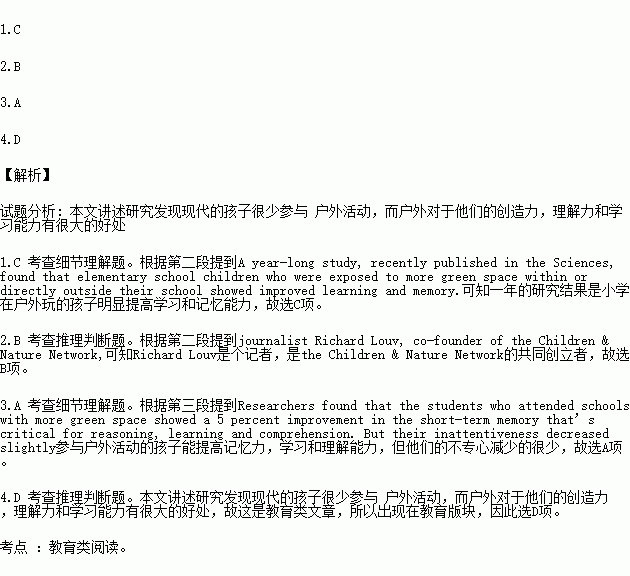题目内容
Children today spend less time outdoors than ever before and it may be harmful not only to their physical health, but also to their cognitive (认知的) development.
A year-long study, recently published in the Sciences, found that elementary school children who were exposed to more green space within or directly outside their school showed improved learning and memory. The findings reinforce (加强) that of a recent six-year study on 905 Massachusetts public elementary schools, which found that students in schools that had more “greenness” in their surroundings reported higher scores on standardized testing in English and math. “There is an expanding body of scientific evidence linking the human experience in the natural world to better physical and mental health and improved cognitive abilities,” journalist Richard Louv, co-founder of the Children & Nature Network, said in an email to The Huffington Post. “An increasing number of homeschoolers, nature preschools, independent primary and secondary schools, and forward-thinking public schools are incorporating (并入) nature experience into learning.”
The new study was conducted on more than 2,500 children in second, third and fourth grade at 36 primary schools in Barcelona, Spain. Researchers found that the students who attended schools with more green space showed a 5 percent improvement in the short-term memory that’s critical for reasoning, learning and comprehension. But their inattentiveness decreased slightly.
Spending time outside could have a number of benefits for children beyond improved memory and attention. Another recent study found that adventurous outdoor play such as climbing, rough and tumble (翻筋斗) play, and exploring alone improves children’s physical health while also help them develop creativity and social skills greatly.
Some schools are starting to take notice, creating more space for children to enjoy being in nature, including community gardens, outdoor playgrounds and small parks.
1.What did the study lasting a year find?
A. The cognitive abilities of children today decreased.
B. The findings of another six-year study were incorrect.
C. Being exposed to nature was beneficial to the learning of pupils.
D. Students had higher scores on testing in English and math than before.
2.According to the passage, what can we know about Richard Louv?
A. He discourages students from getting close to nature to gain experience.
B. He is one of the founders of the Children & Nature Network.
C. He conducted the study on 905 Massachusetts public elementary schools.
D. He often contributes articles to The Huffington Post.
3.Spending time in green space may have little effect on children’s __________.
A. inattentiveness B. creativity
C. communication D. learning
4.In which column of a newspaper can you see this article?
A. Entertainment. B. Travel.
C. Parenting. D. Education.

